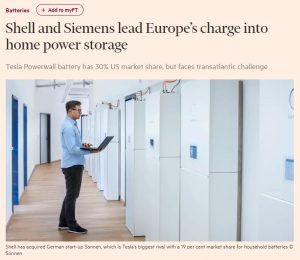 “As soon as battery costs go down a little more, we see solar and wind, plus batteries, becoming a very attractive option” – Frank Rijsberman, Global Green Growth Institute
“As soon as battery costs go down a little more, we see solar and wind, plus batteries, becoming a very attractive option” – Frank Rijsberman, Global Green Growth Institute
A few days after that acquisition, Siemens announced it would begin selling the Junelight Smart Battery, the first battery storage system offered by Europe’s largest industrial conglomerate for private homes. “We think this is a sign of how exciting the battery market is,” says Frank Rijsberman, director-general of the Global Green Growth Institute, which works with governments to support sustainability.
“Solar and wind are now past the stage of being only commercially attractive,” he adds.
“Solar is now cheaper than coal in many places, but the storage is still the issue.
As soon as battery costs go down a little more, we see solar and wind, plus batteries, becoming a very attractive option.”
The market for residential home batteries — like the market for electric vehicles — is rather niche today, but it is growing quickly.
According to research consultancy Frost & Sullivan, some 90,000 residential battery storage units were purchased in 2017 led by Germany, Australia and the US, which together comprise nearly three-quarters of the global market. By 2025, Frost expects the market to multiply six-fold to 531,000 units, as battery costs drop and manufacturers’ ability to scale ramps up. A further catalyst should be that more countries will introduce government incentives for homeowners to switch from centralised power plants based on fossil fuels. In terms of revenue, Frost predicts the market will grow from $711m in 2017 to $4.6bn in 2025.
Mr Rijsberman says what sets Sonnen and Tesla apart from the competition — such as South Korea’s LG — is the software they deploy to help homeowners manage their energy and sell any excess power to other battery users or the wider grid.
“The largest reason they are more interesting than LG or some of the other cheaper batteries is they offer intelligent power management solutions,” he says. “The software with it is smart — it offers deep integration that will power the Internet of Things. That is the future of many battery applications.”
Read more here.